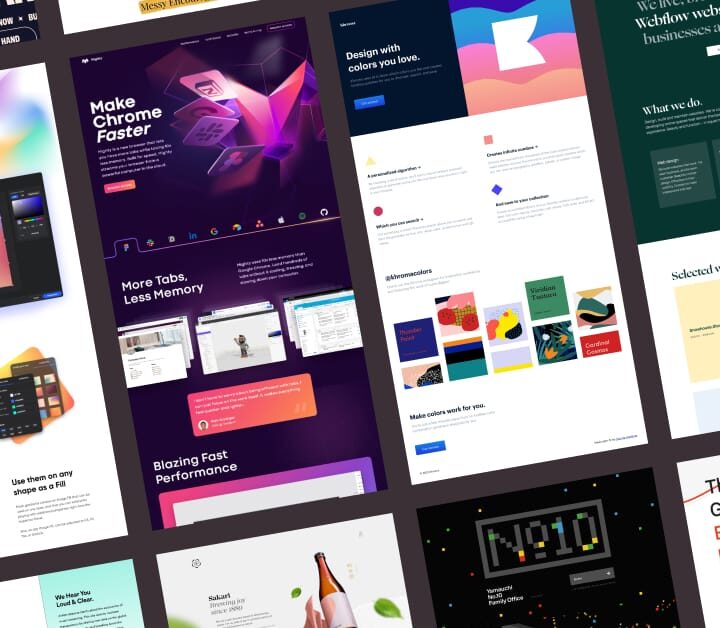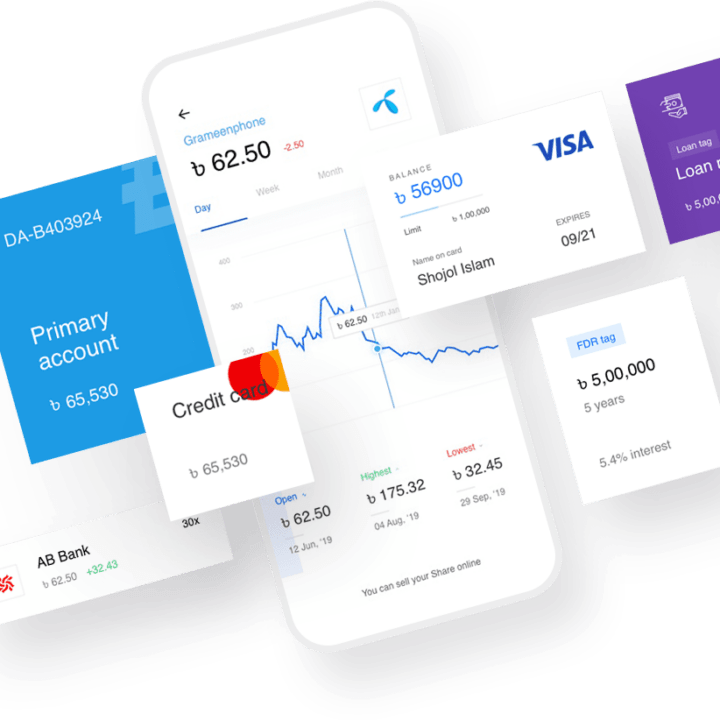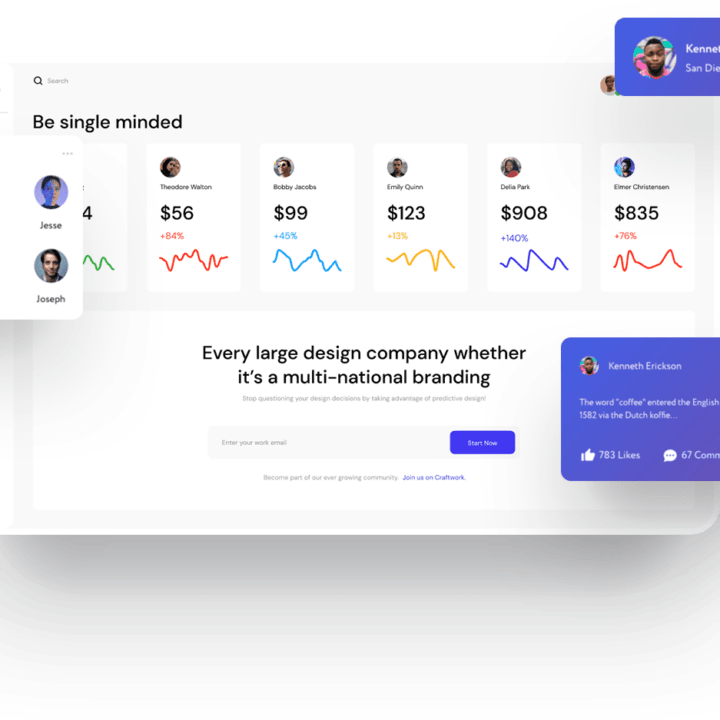DIY vs. Professional: When Small Businesses Should (and Shouldn’t) Use Website Builders
You’re staring at your computer screen at 11 PM, wrestling with a decision that could make or break your business’s online success. Should you roll up your sleeves and build your website yourself, or bite the bullet and hire a professional developer? It’s a question that keeps 43% of small business owners awake at night, according to recent surveys. The stakes feel enormous because they are – your website isn’t just a digital business card anymore; it’s your 24/7 salesperson, credibility builder, and often the deciding factor between a customer choosing you or your competitor. But here’s what most business owners don’t realize: the choice isn’t just between expensive professional development and cheap DIY disasters. The best website builder platforms have revolutionized this equation, offering a third option that combines professional results with DIY control and budget-friendly pricing.
The Real Cost of Getting Your Website Wrong
Beyond the Price Tag: What Poor Website Decisions Actually Cost
Before diving into the DIY versus professional debate, let’s address the elephant in the room: the hidden costs of making the wrong choice. A poorly executed website doesn’t just waste money – it actively damages your business.
Lost Revenue from Poor First Impressions Research shows that 94% of first impressions are design-related, and users form these opinions within 50 milliseconds. A unprofessional-looking DIY disaster or an overpriced developer creation that doesn’t convert visitors can cost you thousands in lost sales monthly.
SEO Penalties That Hurt for Years Choose the wrong approach, and you might end up with a website that search engines ignore. Poor technical implementation can take months or years to recover from, during which your competitors dominate local search results.
The Opportunity Cost Factor Every hour you spend wrestling with complex website code is an hour not spent growing your business. Many business owners who choose the wrong DIY approach end up investing 100+ hours only to achieve mediocre results.
When DIY Website Building Makes Perfect Sense
Scenario 1: You’re Just Getting Started and Budget is Everything
Your Situation: You’re launching a new business with limited capital, need an online presence quickly, and aren’t ready for significant website investments.
Why DIY Works: Modern website builder for small business platforms like Pixel Cloud Media allow you to create professional-looking websites without upfront developer costs. You can start simple and expand as your business grows.
Success Markers:
- Your business model is straightforward
- You need basic pages: Home, About, Services, Contact
- You’re comfortable learning new technology
- You have 10-20 hours to invest in the initial setup
Scenario 2: You Need Complete Control Over Updates and Changes
Your Situation: Your business information changes frequently, you launch new services regularly, or you want to update content without waiting for developer availability.
Why DIY Works: With the best website builder platforms, you can make instant updates. Change your hours, add new services, update photos, or modify pricing in real-time.
Success Markers:
- You’re detail-oriented and enjoy organizing information
- Your business requires frequent content updates
- You want to add blog content or news updates regularly
- You prefer immediate control over your online presence
Scenario 3: Standard Business with Standard Needs
Your Situation: You run a local service business, retail shop, restaurant, or professional service that needs a solid, professional website without complex custom functionality.
Why DIY Works: Industry-specific templates from platforms like Pixel Cloud Media include all the features your business type needs. No custom development required.
Success Markers:
- Your competitors have similar websites that work well
- You need standard features: contact forms, photo galleries, service descriptions
- Your business model fits established templates
- You want proven, conversion-optimized layouts
Scenario 4: You Want to Learn and Grow Your Digital Skills
Your Situation: You’re interested in understanding how websites work and want to develop skills that will help you market your business more effectively online.
Why DIY Works: Modern website builder platforms are educational. You’ll learn about SEO, user experience, and digital marketing while building your site.
Success Markers:
- You enjoy learning new skills
- You see website management as a valuable business competency
- You want to eventually handle your own digital marketing
- You have patience for the learning curve
When Professional Development is the Right Choice
Scenario 1: Complex Functionality Requirements
Your Situation: Your business needs custom features that don’t exist in standard website builders – complex booking systems, unique e-commerce workflows, custom databases, or integration with specialized business software.
When to Go Professional: If your website builder for small business can’t accommodate your specific functionality needs, custom development might be necessary.
Warning Signs You Need Custom Development:
- You need multi-step booking processes with complex logic
- Your inventory system requires custom integration
- You need membership sites with tiered access levels
- Your business processes don’t fit standard templates
Scenario 2: You Have Zero Interest in Technology
Your Situation: The thought of building a website yourself feels overwhelming, you’d rather focus entirely on running your business, and you have the budget for professional development.
When to Go Professional: If technology stress will negatively impact your business focus, hiring professionals might be worth the investment.
Consider This Alternative: Before committing to expensive development, try a user-friendly website builder with excellent customer support. Many business owners who thought they “couldn’t do websites” find modern builders surprisingly manageable.
Scenario 3: Brand-Critical Businesses with Unique Design Needs
Your Situation: Your business competes primarily on brand perception, you need completely unique design elements, or you’re in a creative industry where design differentiation is crucial.
When to Go Professional: If your success depends on having a completely unique visual identity that can’t be achieved with customizable templates.
The Template Test: Before assuming you need custom design, explore high-quality templates from professional website builders. Modern templates are highly customizable and often indistinguishable from custom designs.
The Middle Ground: Professional-Quality DIY Solutions
How Modern Website Builders Bridge the Gap
The traditional DIY versus professional debate assumes you must choose between amateur results and professional costs. Pixel Cloud Media’s website builder represents a third option: professional-quality results through user-friendly DIY tools.
Professional Design Without Professional Costs Templates created by professional designers give you the visual impact of custom design without the associated costs or timeline.
Advanced Features Without Advanced Complexity Built-in SEO optimization, mobile responsiveness, security features, and business integrations that would cost thousands in custom development.
Professional Support for DIY Projects Expert guidance when you need it, without paying for full-service development.
Decision Framework: DIY Website Builder vs. Professional Development
The Business Impact Assessment
Question 1: What’s Your Timeline?
- Need it in days/weeks: Choose a website builder for small business
- Can wait 2-6 months: Professional development becomes viable
- No rush but want control: Website builder for long-term flexibility
Question 2: What’s Your True Budget? Don’t just consider upfront costs. Factor in:
- Ongoing maintenance and updates
- The cost of delayed launch
- Your time investment value
- Future modification needs
Question 3: How Unique Are Your Requirements?
- Standard business needs: Website builders excel here
- Somewhat unique: Test if builders can accommodate your needs
- Truly unique functionality: May require custom development
Question 4: Who Will Maintain the Website?
- You want control: Choose a user-friendly website builder
- Prefer hands-off approach: Budget for ongoing developer maintenance
- Mixed approach: Builder with professional support options
The ROI Calculation That Changes Everything
Traditional Professional Development ROI:
- Upfront cost: $5,000-$15,000
- Ongoing maintenance: $200-$500/month
- Update delays: Lost opportunities
- Time to launch: 2-6 months of missed revenue
Quality Website Builder ROI:
- Fast launch: Start generating leads immediately
- No ongoing developer costs: More profit margin
- Immediate updates: Capture time-sensitive opportunities
- Learning benefits: Improved digital marketing skills
Industry-Specific Recommendations
Local Service Businesses (Contractors, Plumbers, Electricians)
Recommendation: Website builder for small business is typically the best choice.
Why: Your customers care about credibility, easy contact, and service information. Template-based sites with local SEO optimization serve these needs perfectly. Custom development rarely provides additional value for local service businesses.
Red Flags for Custom Development: Developers promising “revolutionary” features that don’t directly generate leads.
E-commerce and Retail
Recommendation: Start with a comprehensive website builder that includes e-commerce functionality.
Why: Built-in e-commerce features, payment processing, and inventory management handle 90% of retail needs without custom development costs.
When to Consider Custom: If you’re selling 1000+ products with complex variations or need integration with enterprise-level inventory systems.
Professional Services (Lawyers, Consultants, Accountants)
Recommendation: Professional website builders with industry-specific templates.
Why: Professional credibility comes from clean design, clear information architecture, and trust signals – all achievable with quality templates.
Custom Development Consideration: Only if you need complex client portals or document management systems.
Creative Professionals (Photographers, Designers, Artists)
Recommendation: High-quality website builder with excellent image optimization and gallery features.
Why: Modern builders offer stunning portfolio templates with the image quality and presentation capabilities creative professionals need.
Custom Development Consideration: Only if your art requires interactive elements or unique presentation methods.
Restaurants and Food Service
Recommendation: Website builder for small business with restaurant-specific features.
Why: Online menus, location information, hours, and photo galleries are standard features in restaurant templates. Custom development rarely adds value for food service businesses.
Integration Needs: Ensure your builder can integrate with delivery platforms and reservation systems.
The Hidden Advantages of DIY Website Building
Skill Development That Transforms Your Business
When you build your own website using a professional website builder, you’re not just creating a website – you’re developing digital marketing skills that will benefit your business for years.
SEO Understanding: You’ll learn how search engines work and how to optimize your content for better visibility.
User Experience Awareness: Building your site teaches you to think like your customers, improving all your business communications.
Digital Marketing Foundation: Website management skills transfer directly to social media marketing, email campaigns, and online advertising.
Flexibility That Professional Development Can’t Match
Immediate Response to Market Changes When your industry shifts, your pricing changes, or you launch new services, you can update your website instantly. No waiting for developer availability or paying for minor updates.
A/B Testing Capabilities Try different approaches to see what works best for your customers. Change headlines, images, or layouts based on what generates more leads.
Seasonal Optimization Adapt your website for holidays, seasonal services, or special promotions without additional costs or delays.
Red Flags: When DIY Might Not Be Right for You
Technology Anxiety That Affects Business Focus
If the thought of managing a website creates significant stress that interferes with running your business, the DIY approach might not be worth the mental bandwidth. However, consider trying a user-friendly website builder with excellent support before giving up entirely.
Perfectionism That Prevents Progress
Some business owners get so caught up in making their DIY website “perfect” that they never launch. If you’re prone to endless tweaking, set firm deadlines or consider professional help.
Unique Technical Requirements
If your business truly needs functionality that doesn’t exist in website builders, custom development might be necessary. However, verify this is actually the case rather than assuming it.
Making the Decision: Your Action Plan
Step 1: Define Your Success Metrics
Before choosing between DIY and professional development, clarify what success looks like:
- Lead generation targets
- Professional appearance requirements
- Timeline constraints
- Budget limitations
- Ongoing maintenance preferences
Step 2: Test Before You Commit
Try Pixel Cloud Media’s website builder with a simple test project. Spend 2-3 hours exploring the platform to see if it meets your needs before making larger decisions.
Step 3: Calculate True Costs
DIY Website Builder Costs:
- Platform fees
- Your time investment (hourly value)
- Learning curve time
- Ongoing management time
Professional Development Costs:
- Initial development fees
- Ongoing maintenance contracts
- Update and modification costs
- Communication and revision time
Step 4: Consider Hybrid Approaches
Many successful small businesses use a hybrid approach:
- Start with a website builder for small business to launch quickly
- Invest savings into marketing and business growth
- Upgrade to custom development only when specific limitations become growth barriers
The Future of Small Business Websites
Why the DIY vs. Professional Debate is Evolving
The gap between DIY and professional websites continues to narrow as website builder platforms become more sophisticated. Features that required custom development just five years ago are now standard in quality builders.
Artificial Intelligence Integration Modern builders use AI to optimize layouts, suggest improvements, and even generate content, giving DIY users access to professional-level optimization.
Advanced Customization Options Today’s best website builder platforms offer customization capabilities that rival custom development for most business needs.
Professional Support Integration Hybrid models where DIY builders include access to professional designers and developers are becoming more common, offering the best of both worlds.
Common Mistakes That Lead to Wrong Decisions
Mistake 1: Choosing Based on Price Alone
The cheapest option often becomes the most expensive when you factor in lost opportunities, poor results, and the need to rebuild later.
Mistake 2: Overestimating Your Technical Needs
Many businesses assume they need custom development when standard website builder features would serve them better.
Mistake 3: Underestimating the Learning Curve
Whether you choose DIY or professional development, budget time for the learning curve of managing your online presence effectively.
Mistake 4: Ignoring Long-term Maintenance
Factor ongoing maintenance, updates, and modifications into your decision. The most beautiful custom website becomes a liability if you can’t afford to maintain it.
Success Stories: Real Businesses, Real Results
Local Service Business: From Developer Disaster to DIY Success
The Challenge: A plumbing company paid $8,000 for a custom website that took 6 months to complete and generated zero leads.
The Solution: Rebuilt using Pixel Cloud Media’s website builder in one weekend.
The Results:
- 300% increase in online inquiries within 30 days
- First-page Google rankings for local searches
- Complete control over updates and seasonal promotions
Professional Service: Why Simple Won
The Challenge: A law firm assumed they needed a complex custom website to appear credible.
The Solution: Professional template from website builder for small business platform, customized with their branding.
The Results:
- Professional appearance that builds trust
- Easy content management for legal updates
- Significant cost savings reinvested in marketing
Your Decision Framework: Questions to Ask Yourself
The Honest Assessment
Question 1: “Am I avoiding DIY because of actual limitations or fear of technology?”
Many business owners rule out website builders without testing modern, user-friendly options. Try Pixel Cloud Media’s platform before deciding it’s too complex.
Question 2: “What does my business actually need that I can’t get from a quality website builder?”
Be specific about functionality requirements. Generic answers like “professional appearance” or “good SEO” are achievable with quality builders.
Question 3: “How will I handle ongoing updates and maintenance?”
If you choose professional development but can’t afford ongoing maintenance, your website will become outdated quickly.
Question 4: “What’s the real cost of delayed launch?”
Every month without a website is lost revenue and missed opportunities. Factor this into your decision timeline.
The Verdict: Why Most Small Businesses Should Choose DIY
The Evidence Overwhelmingly Supports Modern Website Builders
For 85% of small businesses, a professional website builder for small business delivers better results than custom development when you factor in:
- Speed to market: Launch in days, not months
- Total cost of ownership: No ongoing developer dependencies
- Flexibility: Immediate updates and modifications
- Professional results: Templates designed by experts
- Learning benefits: Skills that improve all your marketing
The 15% Exception: When Custom Development Makes Sense
Custom development is the right choice when:
- You have truly unique functionality requirements that don’t exist in any builder
- Your budget comfortably accommodates $10,000+ upfront plus ongoing maintenance
- You have complex integration needs with enterprise software
- Your business model depends on completely unique user experiences
Making Your Choice: The Path Forward
If You’re Leaning Toward DIY
Start with a trial: Test Pixel Cloud Media’s website builder to see if it meets your needs before committing to any approach.
Set realistic expectations: Plan for a learning curve, but don’t let perfectionism prevent progress.
Choose the right platform: Not all website builders are created equal. Choose one designed specifically for small business success.
If You’re Considering Professional Development
Validate your requirements: Ensure you actually need features that builders can’t provide.
Budget for the total investment: Include ongoing maintenance, updates, and the cost of delayed launch.
Consider the hybrid approach: Start with a builder to launch quickly, then upgrade if growth demands it.
Your Website Success Starts with the Right Choice
The DIY versus professional website debate isn’t really about technical capability – it’s about choosing the approach that best serves your business goals, timeline, and budget. For most small businesses, modern website builders like Pixel Cloud Media offer the perfect balance of professional results, user control, and business value.
Your competitors are online right now, capturing customers while you’re still deciding. The good news? You’re just hours away from having a professional website that works as hard as you do.
Discover why thousands of small businesses choose Pixel Cloud Media’s website builder for professional results without professional costs.
Don’t let the perfect be the enemy of the good. Your customers need to find you online, and they need to find you now. Start building your professional website today and see why the DIY versus professional debate has a clear winner for smart small business owners.





